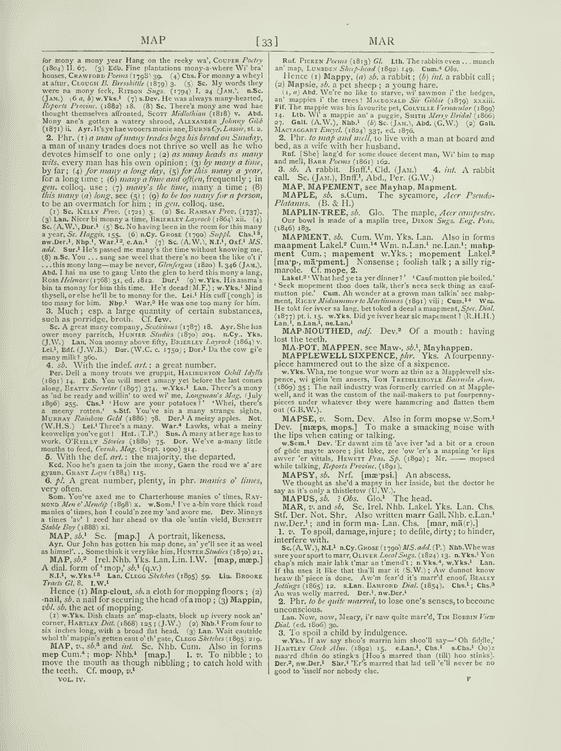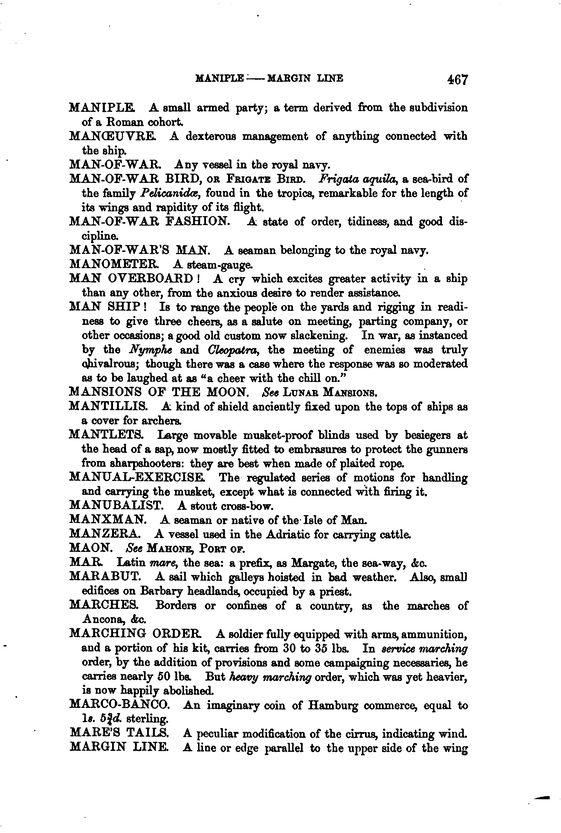Mire
Source : Wright, Joseph English Dialect Dictionary
MIRE, sb. and v.1 Var. dial. uses in Sc. and Eng. Also written myre- Lnk.; and in forms mwire se.Wor.1; myer Wm. [mair, mai·aə(r.] 1. sb. A bog, swamp; wet, boggy land. Sh.I. Cut his own peats, and carried them home from the mires, Clark N. Gleams (1898) 18; He flew like thought, over peats, banks, and mires, and everything, Burgess Sketches (2nd ed.) 61. Ayr. So ran the far-famed Roman way, So ended in a mire, Burns On the Seat of Lord Galloway, No. 3. Lakel.1 Found in place names, as The Mire, Pelutho Mire, Mire Side; Lakel.2 Shap Mires. n.Yks.1 Frequent in local names, as Pundermire, Tranmire, &c. Dev. The large marshes, or as they are very properly called, mires of Dartmoor, Bray Desc. Tamar and Tavy (1836) I. lett. 19; Certain quaking bogs undermine the ground half-way, and it would be a sorry commencement to the day's work to be ‘stugged in a mire,’ as the moor-men have it, Page Explor. Dartmoor (1889) v; No plough will ever go through ‘those mires,’ or peat-filled vales, Cornh. Mag. (Nov. 1887) 508. nw.Dev.1 Hence Mire-side, sb. the side or edge of a bog or swamp. Lnk. Had I no, bie chanss, cum here, I had died at sum myre-syd, Ramsay Gentle Shep. (Scenary ed.) 720. 2. Comp. (1) Mire-crow, the black-headed gull, Larus rudibundus; (2) Mire-drum, the bittern, Botaurus stellaris; (3) Mire-drumbler, the snipe, Gallinago coelestis; (4) Mire-duck, the wild duck, Anas boscas; (5) Mire-snipe, (a) see (3); (b) fig. a person with hard features; (c) an accident; misfortune; (5) (d) in phr. to catch a mire-snipe, to get into a bog, to ‘mire’ oneself. (1) Cor. Rodd Birds (1880) 315. [Swainson Birds (1885) 209; Forster Swallows (ed. 1817) 92.] (2) n.Cy. (K.), N.Cy.1 N.Cy.2 Nhb.1 Now a rare, casual visitant. Lakel.1 A bird frequenting swampy and miry wastes, in which it kept up a continuous drumming sound. Cum. Hutchinson Hist. Cum. (1794) I. App. 18; Cum.1 Wm. Hullet, herrensue, or miredrum, Hutton Bran New Wark (1785) l. 337. nw.Der.1 Nrf. Grose (1790). Suf.1 Cor. Rodd Birds (1880) 315. [Forster Swallows (ed. 1817) 83.] (3) Stf. Ray (1691) MS. add. (J.C.) (4) Frf. Swainson Birds 156. Cum.4 (5, a) Cai.1 Abd. Swainson Birds 192. Edb. Nor ne'er a miresnipe in the fen, Liddle Poems (1821) 145. Nhb.1 (b) Bnff.1 A' nivver saw sic a mire-snipe o' a craitur o' a wiffie's he's gotten. (c) Cai. I met wi' a miresnipe (Jam.). (d) Slk. (JAM.) 3. Phr. to be one as deep in the mud as the other in the mire, to be much the same, to be ‘six of one and half a dozen of the other.’ War.3 Lei.1 Theer 'evn't a pin to chewse atwixt 'em: wan's as bad as t'oother; wan's as dip i' the mood as t'oother i' the moire. 4. v. To bedaub or cover with mud. Also with up. Cum. Richardson Talk (1876) 2nd S. 35. se.Wor.1 5. To stick fast in mud; gen. in pp. Sc. (A.W.) Cum. I've often knawn cattle get mired in a creyke (E.W.P.). Wm. Myert in a peeat pot, tummalt intet Boondry Dyke, Spec. Dial. (1885) pt. iii. 10. Ken. By the great distance between the wheels, the load is more easily drawn across sloughs, the four, unless where sloughs are very wide, being seldom mired at the same time, Marshall Review (1817) V. 486. Sus. (S.P.H.) 6. Fig. To entangle in a dispute. Sc. The gentleman is mired, and seems not to know well what to plead for himself, Magopico (ed. 1836) 24; They finding themselves mired, stood not to deny it, Shield Society Contendings (1780) 194 (Jam.). Ayr. An' in the depth of science mir'd, Burns Lett. to J. Tennant, l. 14.
MIRE, v.2 Obsol. Glo. Suf. To wonder; to admire. Glo.1 Glo.2 e.Suf. Used by the old only (F.H.). [Heere but alas he myred what course may be warelye taken, Stanyhurst Aeneid (1582) iv. 292 (Dav.).]
MIRE, MIRE-BLOB, see Mear, sb., Mare-blob.

Source : Admiral W H Smyth - The Sailor's Wordbook
